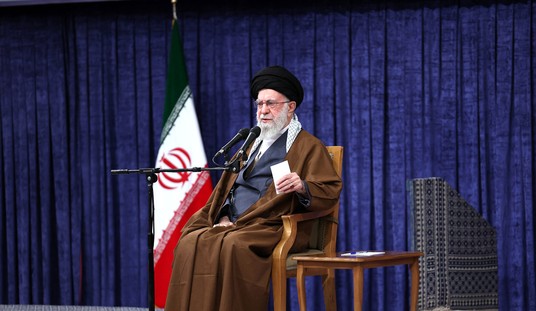No, really. Did we expect Hosni Mubarak to rule for another decade and then quietly die in a hospital in Switzerland and transfer the presidency to Gamal Mubarak? Or did we expect him to hand over power to Omar Suleiman or another military man? Is that how the West expected its alliances to not crumble?
The truth is, we — and by that I mean all the pro-democracy/anti-Islamic fundamentalist crew — had no plans. The fort in Egypt was going to be held by Mubarak and Co. and that’s that. We simply slept and concentrated on the Taliban, Hamas, Hezbollah, and al-Qaeda. Heck, nobody even mentioned the Muslim Brotherhood or paid heed to warnings from people with experience in Middle Eastern affairs that after the protests in Iran in 2009, things were not going to be the same. That is until the wave of protests in Tunisia hit us with the truth.
And the truth is we didn’t make the right allies. The men who rule much of the Islamic world with an iron fist aren’t there to protect the West from the coming “caliphate,” which I might add is a laughable idea. (You need only see the bickering between Iran, Afghanistan, and Pakistan to realize that a united Islamic empire is a dream that will never come to fruition).
Middle Eastern dictators are allies to themselves only. Of course, if they can consolidate their power by pandering to Western demands a bit, they will. To them, Islamic fundamentalism is just as scary as political dissidents who want democracy, civil rights, and economic prosperity. Yet we are wondering who will be the next ally to fall and ignoring the obvious question: how do we make allies with the people?
Herein lies our first misconception: The West is allied with Egypt. The West was never allied with Egypt. It was allied with Mubarak. And something tells me that in hindsight, we were fully aware of this fact because now that there is a chance that the people of Egypt might rule themselves, we’re fearful of the alliance’s future. But few — even Emperor Obama I of the Freedom Federation — were willing to admit this before Cairo erupted in protests.
Again, what exactly did we expect? Why didn’t we start pressuring Mubarak before he was thrown out of office to bring about democratic reform? President Bush realized this and took a few steps. But why didn’t those steps transform into real action? Because we continuously treat Muslims and people from the Arab world as illiterate savages who will never learn the meaning of democracy, civil rights, and the power of the people to overthrow autocrats. They were not good enough to be allies, and only the brutal dictators that ruled them were reasonable to be friends with.
That gave rise to the second misconception: while Mubarak and Co. ruled with brutality, the only people who were concerned about the human rights situation in their domain lived in the West.
Two weeks ago, the night protesters in Tahrir Square were being fired upon from all sides by thugs and criminals with sniper rifles, and many in the West thought it was the end of the uprising. I got this message from a guy in the square: “There are women and children here. The thugs are shooting at us. I see people getting hit. I see blood. I know they want to force us out of here. But I won’t go. We want dignity. We want freedom. We want prosperity. Thirty years of oppression is simply too much for me to care about my life. Either Mubarak leaves or we all die here.”
Hours later, the thugs left. The square was never attacked as seriously again.
Why weren’t we trying to make alliances with people like him?
Don’t tell me we can’t pressure dictators who are allies to stop oppressing their people like that. Mubarak was pressured into keeping the alliance with Israel intact. He was pressured into joining the fight against Islamic fundamentalism. He could have been pressured into giving Egyptians more civil liberties the same way. He could have been pressured into opening up the society to some semblance of freedom of speech. He could have been pressured into beginning at least a low-level — maybe provincial-level or district-level — but credible form of democracy.
Egypt relies on the West too much economically for this to not have been possible to at least some degree. But we didn’t care. Because let’s be honest, nobody wanted a gradual takeover of the political system by the Islamists.
First, it was the fear of communism that forced us to support dictatorships in Islamic societies. Now it’s the fear of Islamic fundamentalism. There is no way of denying this fact.
Meanwhile, we busied ourselves fighting an open war against Islamic fundamentalism that gave rise to an Iraq drenched in Sharia law and an Afghanistan that looks like a real-life version of Groundhog Day directed by Robert Rodriguez. We did little to prepare ourselves for this day and now that it’s here, we’re either panicking and thinking of war or simply hiding ourselves in a shell and pretending that Egypt is not threatened by the Brotherhood.
And our final misconception for the ages: Democracy in Islamic countries will result in the takeover of the countries by Islamists. Why do we continuously forget the examples of Indonesia, Malaysia, and Pakistan? Why is it that even though the populations of those countries are largely Muslim, fundamentalist parties never seem to garner enough votes to govern those countries?
But few of us are asking those questions. Most of us are debating how we’re going to fight World War III, forgetting the fact that the Egyptian military is firmly on the side of the West. Instead of promising them a few more billions in return for their loyalty in democratizing Egypt and fighting Islamic fundamentalism, we’re terrified of the rise to power of Islamists in Egypt as if we’ve lost all leverage.
Yes, it is likely that the Brotherhood will participate in the upcoming elections if they are democratic. And yes, it is a fact that they will win a large chunk of the vote and be part of a unity government or the largest party in the opposition or even the ruling party.
But to fight it, we have money and influence that we can use directly and indirectly to ensure that the Egyptian people aren’t robbed like the Iranian people were. We need to use both our influence and money to ensure any Egyptian constitution includes separation of church and state. We have to get immediate guarantees from the Egyptian military that it will thwart any Muslim Brotherhood attempt at altering the nature of Egypt’s coming future from a secular democracy to a theocratic mullahcracy or the country’s international treaties and obligations.
Most importantly, however, we have to ensure that any future Egypt is what the enlightened Egyptians want it to be — a secular, democratic, and prosperous society. Only when that has been accomplished will the West have allies in Egypt. Not one man and a few dozen of his cronies — but 80 million people who are descendants of the oldest continuous civilization humanity has to offer.
And in the future, let’s start working on helping the people of the Middle East become our allies. Let’s stop pretending all’s well, because this wave of protest might not stop at Egypt. There are those who’ve warned of this before. Let’s pay attention to them and act before it is too late.
Did you read the news about Algeria today?









Join the conversation as a VIP Member